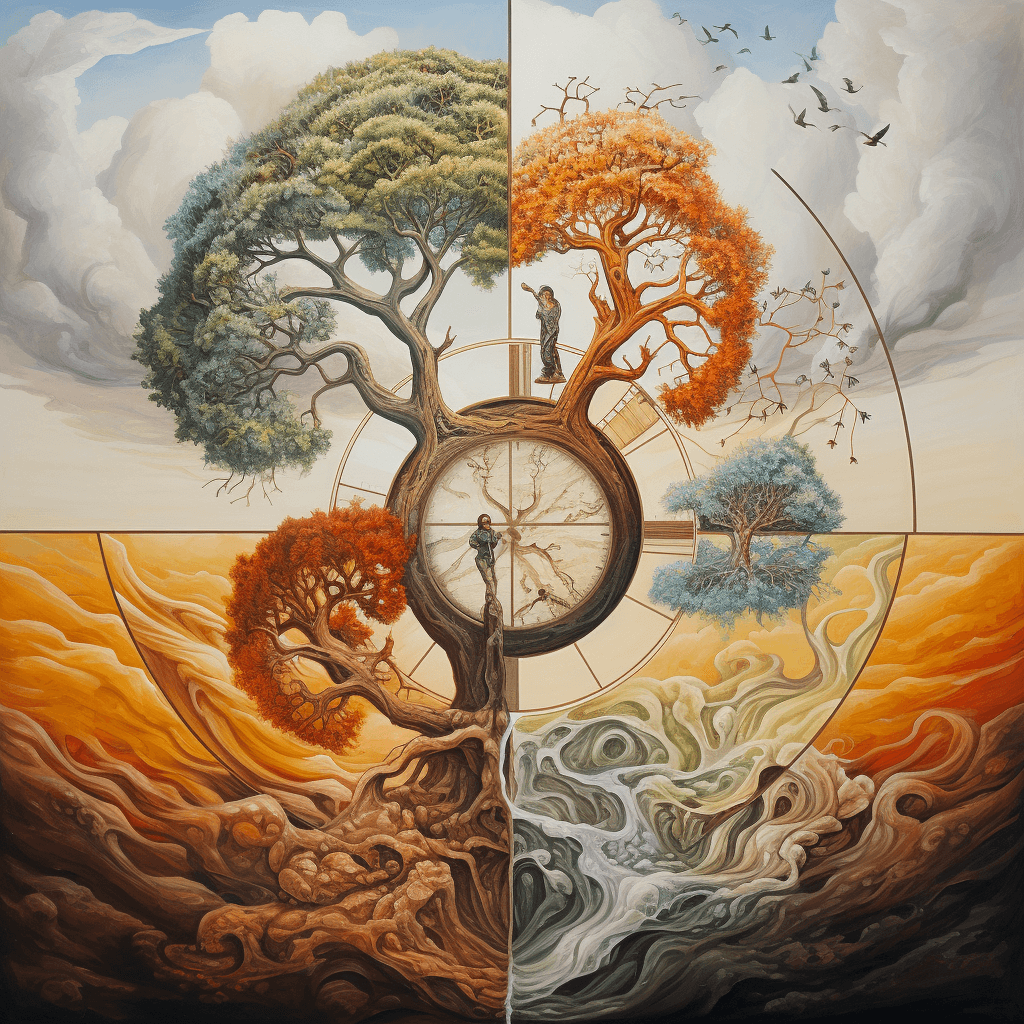Decoding the Uncertainty of the 2020s Through Nature’s Cycles

The pandemic marked a turning point, ushering in a new era of uncertainty. This life-threatening period compelled us to immediately rethink and modify our daily routines. Work transitioned to remote settings, monetary transactions became almost entirely digital, and socializing moved to virtual platforms. The lack of concrete information about the virus only exacerbated the confusion.
Yet we persevered, and while business has largely returned to normal, a sense of uncertainty remains. News of failing banks, a prolonged crypto winter, deglobalization, geopolitical unrest, wars, AI disrupting jobs, and a reimagining of the future of work fills the air daily. It is as if we are inundated with an ever-growing list of question marks, challenging all that we've come to accept in our lives.
I've noticed that the seeds of change were planted around the time of the 2008 financial crisis, which also gave birth to Bitcoin. The years 2019 and 2020 unveiled the potential of digital currencies, transparent blockchains, and the foundational layers of web3 infrastructure. If we compare our recent experiences to events post-World War II, few incidents have rattled global populations and financial systems to the same extent.
In 2021 and 2022, I was optimistic about decentralized technologies but occasionally pondered their future. Will we see complete adoption in the next 5 to 10 years? Or will the industry sabotage itself through hacks and unethical practices, succumbing to the demands of regulators and centralized institutions
Web3 promises a financial and data revolution—a systemic shift. But will it actually materialize? How can we be sure it will manifest, one way or another? What evidence do we have to believe that our current experiences will benefit humanity?
I found solace in a unique answer: the cyclical patterns of nature. These recurring themes and cycles historically provide insight into our future. The first step in this approach is to think non-linearly, specifically in terms of cycles. I discovered that macro investors and traders often use cycles to understand, observe, and predict markets. Both business cycles and secular themes serve as indicators for economic turns. But where do these cycles originate?
The book "The Fourth Turning: An American Prophecy" by William Strauss and Neil Howe proposes that history moves in 80- to 100-year cycles, divided into four 'turnings':
- High - A period of strong institutions and collective well-being
- Awakening - A period where people question institutions and values
- Unraveling - A period of weakening institutions and individualism
- Crisis - A period of upheaval and potential rebuilding of institutions
These cycles, reflecting the lifespan of a human, have historical roots going back nearly 3000 years to the Etruscans.

The following key events and trends in American history are described through the lens of the turnings by Strauss and Howe, going back over 80 years.
First Turning: The High
Post-WWII Prosperity: This era saw a booming economy, strong social structures, and a sense of collective responsibility. It was a time of optimism, where people believed in the power of institutions to effect positive change.
Second Turning: The Awakening
The Civil Rights Movement: A pivotal time that saw increased activism aimed at ending systemic discrimination against minorities.
The Vietnam War and Protests: This was a tumultuous period characterized by a highly controversial war and widespread public protests, contributing to a sense of social upheaval.
The Feminist Movement: Focused on gender equality, reproductive rights, and other issues important to women, further eroding the previous social consensus.
Counterculture Movement: A social and cultural revolution that challenged the status quo and traditional values, epitomized by events like Woodstock.
Third Turning: The Unraveling
The Watergate Scandal: The first-ever resignation of a U.S. President, deeply undermining trust in political institutions.
Economic Malaise of the 1970s: Characterized by economic stagnation, high inflation, and an energy crisis, this period saw the questioning of America's post-WWII economic dominance.
The Rise of Conservatism: Marked by Ronald Reagan's election, it signaled a swing toward conservative ideologies, often in reaction to the social changes of the previous turning.
Culture Wars of the 1980s and 1990s: These wars were an extension of the ideological battles that started in the second turning, but they became more pronounced and divisive during this period.
Fourth Turning: The Crisis (Anticipated)
Crisis Prediction: Strauss and Howe suggested that a crisis turning could emerge in the early 2000s, characterized by significant fiscal and geopolitical challenges. The idea is that this crisis would be a transformative period that reshapes institutions and social structures.
Each turning has its unique characteristics, informed by the generational attitudes and events of the times. The idea is that history is somewhat cyclical, and understanding these turnings can help predict future trends and challenges.
Interpretation for the 2020s
Many argue that the "Crisis" phase we are currently in was initiated by the 2008 financial crisis and is expected to last until the late 2020s or early 2030s. Here are some examples that characterize this phase:
Polarized Politics: The deep political divides in countries like the United States symbolize a crisis of institutional faith and social cohesion.
COVID-19 Pandemic: A global crisis that has led to significant loss of life and economic disruption, revealing cracks in healthcare and governance systems.
Economic Instability: From record highs in stock markets to severe income inequality and concerns about inflation, economic volatility is notable.
Social Movements: Movements like Black Lives Matter or Extinction Rebellion reflect a deeper crisis in social and cultural norms.
Global Conflicts: Rising tensions between major powers such as the U.S., China, and Russia indicate a geopolitical crisis phase.
Technological Disruption: The rapid rise of technologies like AI, blockchain, and web3 show both the promise and perils (e.g., job loss, privacy concerns) inherent in a period of upheaval.
Climate Crisis: The escalating environmental disasters signal a deepening crisis in our relationship with the natural world. These phenomena are symptomatic of a "Crisis" phase, a period when old institutions are questioned and potentially replaced by new ones.
The categorization of current events into a "Crisis" period is based on the predictions of the model and not universally accepted facts. Critics of "The Fourth Turning" argue that the framework tends to oversimplify complex social phenomena and tries to fit history into predetermined cycles. These phenomena are symptomatic of a "Crisis" phase, a period when old institutions are questioned and potentially replaced by new ones.
The Fourth Turning: Theory or Truth?
The concept of the Fourth Turning serves as a framework for understanding social and historical cycles. Whether one views it as "merely a theory" or as "truth" varies depending on individual perspective, intellectual criteria, and how well the theory aligns with observable phenomena. Here are some points to consider:
Arguments for Theory:
Lack of Empirical Evidence: While the Fourth Turning offers a compelling narrative, it does not meet scientific criteria for empirical validation in the way that a scientific theory would. Interpretative Flexibility: The Fourth Turning relies on historical interpretation, and different historians may disagree on the categorization of events into specific turnings. Limited Predictive Power: Although the theory aims to predict societal trends, its predictions are not always specific or accurate enough to be tested. Cultural Specificity: The Fourth Turning is largely centered around Anglo-American history and may not be universally applicable to other cultures or societies.
Arguments for Truth:
Historical Resonance: Many people feel that the Fourth Turning resonates with observed social and historical cycles, pointing to events like the Great Depression, World War II, and the 2008 financial crisis as evidence.
Conceptual Utility: The theory offers a framework that can help people think about generational shifts, social moods, and potential future events.
Influence on Thought: The concept has influenced various fields, including sociology and political theory, and has been cited by politicians and thought leaders.
Intuitive Appeal: For some, the theory offers an intuitive way to make sense of complex social and historical changes.
Whether the Fourth Turning is viewed as "merely a theory" or "truth" is subject to interpretation. It provides a lens through which to view social and historical developments but lacks the empirical rigor to be universally accepted as factual or predictive. As such, its status likely lies somewhere between a heuristic model and an empirically validated theory. However, if one seeks to make sense of current events and feel more secure about what may come, the historical resonance of these cycles is hard to deny.
Some Philosophies and Frameworks That Resonate
Moreover, the Fourth Turning is not unique in discussing cyclical patterns in history, human development, and social change. Various other philosophies and frameworks also emphasize recurring cycles rather than linear progressions, including:
Hegelian Dialectics: Hegel's idea of thesis-antithesis-synthesis cycles reflects a pattern of conflict and resolution similar to the crises and renewals described in the Fourth Turning.
Taoism and Yin-Yang: The concept of balance and the cyclical nature of life and events in Taoist philosophy can be seen as a parallel to the cyclical approach of the Fourth Turning.
Vedic and Hindu Philosophy: The Yugas in Hindu philosophy describe vast cycles of cosmic time, which, like the Fourth Turning, emphasize the inevitability of decline and renewal.
Spengler's "Decline of the West": Oswald Spengler also posited a cyclical theory of history where civilizations go through predictable stages of rise and decline.
Kondratieff Waves: These are long-term economic cycles that were initially identified to understand the capitalist economy. They resemble the Fourth Turning in that they identify patterns of high and low periods.
Joseph Campbell's "The Hero's Journey": While focused on individual experience, the Hero’s Journey also involves cycles of crisis, resolution, and transformation, akin to societal changes in the Fourth Turning.
Erikson's Stages of Psychosocial Development: Although this pertains to individual development, Erikson also describes life as a series of crises and resolutions, much like the generational cycles in the Fourth Turning.
Nicholas Taleb’s “Black Swan” Theory: Although not cyclical, this theory talks about unpredictable events that cause massive shifts, similar to the “Crisis” stages in the Fourth Turning.
Futurism and Technological Singularity Theories: While generally more linear, these theories do entertain cyclical notions of technological booms and societal restructurings that could be seen as parallel to turnings.
Ecological Models: The concept of ecological succession, where ecosystems go through regular cycles of disturbance and regeneration, also echoes the Fourth Turning’s emphasis on cyclical patterns.
While the Fourth Turning has its unique elements, the underlying idea of cyclical patterns is not new. It finds echoes in various philosophical, religious, and social theories. These similarities suggest a broader human inclination to understand time and history as cyclical, despite prevailing linear models.

To truly grasp the shift that is underway, we need a fundamental change in perspective—from linear thinking to non-linear thinking. This is easier than it sounds, because, as humans, our lives are already cyclical in many ways:
- Life Stages: We progress from childhood to adolescence to adulthood.
- Seasonal Weather: Even in the tropics, it's not sunshine all day, all year round.
- Annual Cycles: Every year, we eagerly await the arrival of specific fruits or vegetables that come into season.
- Moon Cycles: The phases of the moon affect tides and even human behavior.
Cyclicality is more than an abstract concept. It binds us to the rhythms of nature and is something we embody without needing to intellectualize it. In other words, it's built into the "inner engineering" of our being.
“History creates generations, and generations create history. This symbiosis between life and time explains why, if one is seasonal, the other must be.”
What distinguishes the current Fourth Turning from its predecessors is its heightened level of challenge and uncertainty. This turning carries the seeds of rebirth, concluding the current era and sowing the seeds for the next cycle.
If you find the concept of the Fourth Turning intriguing, here's a visual narration of the theory from one of the book's authors.